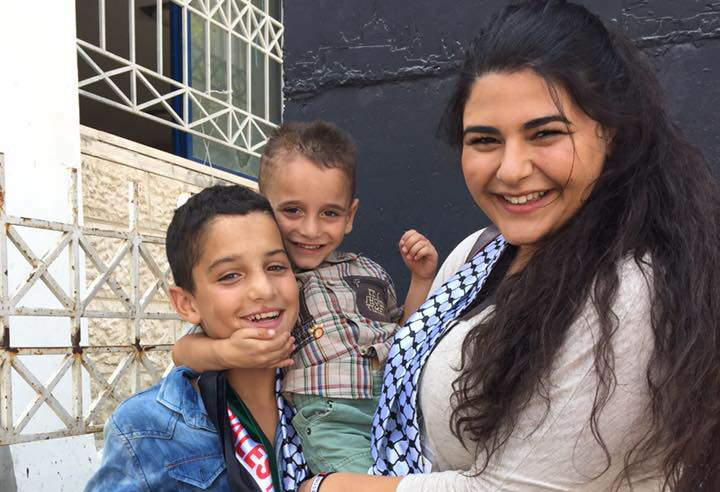
-Yasmine A.
And there I was again for the second time, standing in front of the most horrid and hopeful place that I had ever been: the King Hussein Bridge border crossing, which is controlled by the Israeli army. As the bus drove from the Jordanian border to the Israeli side, I began mentally preparing myself — not for what I was going to be put through, but for the things I would encounter that would reaffirm my knowledge of the Palestinian condition. Upon our arrival, the delegation was pushed through the VIP line often reserved for pilgrims just before the border control could realize that each of our families hail from the Holy Land. It didn’t take long before we were quickly reverted back to the “normal” Palestinian line.
“Your passport,” the border control agent asked. “Have you ever visited Israel before?”
Although my gut told me to say No, but I’ve visited Palestine, I kindly responded, “Yes, in January.”
“What is your father’s name?”
“Majed.”
“And your grandfather’s name?”
“Kamal.”
“Do you have any relatives here?”
“No.”
“I’ll be keeping your passport for further security check. Fill this form out.”
This scenario became the norm for two-thirds of our group. As we began our long wait, we watched tirelessly as hundreds of Palestinian families waited in line like sheep, only to be denied entry, interrogated, or pushed through to clear the terminal. As emotions ran high, KTH delegates began reassuring one another of the promise of change the future holds.
When I saw the first tears shed from my fellow delegates, I thought it was due to fear of the border control processes — but it was not. My fellow delegates — composed of almost 40 Palestinian youth from countries around the world — were upset and frustrated with the Israeli border police’s treatment of Palestinians who sought nothing more than to simply go home. Everything we had read, seen on the news, and heard from family members came to life before our eyes in that waiting room. After several hours of waiting in an empty terminal, all the delegates were finally granted visas.
We did it — we had finally made it to Palestine.
But before I continue, allow me to return to the first sentence: And there I was again for the second time, standing in front of the most horrid and hopeful places that I had ever been. As these Palestinians were being pushed through a humiliating process that is encountered on a regular basis, not one of them tried to fight back — not one was physically resistant or emotionally outspoken. They waited. They were patient. They reaffirmed the Palestinian love for peace and their desire for coexistence. They replaced despair with hope.
The Welcome
Our first stop was Jericho: the birthplace of my father.
As the border drifted further and further away into the distance behind our moving bus, every single delegate couldn’t help but notice the huge welcoming Palestinian flag swaying in the wind, reminding us that we finally made it home. Jericho is not only home to the world’s most delicious dates, but is also home to the official passage into the State of Palestine. As many of us took our steps on our ancestral homeland, we were welcomed by members of the city’s youth council — each donned in Palestinian shawls — ready to escort us through the gates of Palestine.
The Homecoming
After driving through the scenic route that connect Jericho and Bethlehem, our bus driver suddenly came to a stop and opened the doors as if he were going to drop us off on the street. Much to our surprise, that’s exactly what he was doing. However it was only until we took our firs steps off that bus that we noticed what was awaiting us. We disembarked the bus to find hundreds of Palestinians waiting to welcome us — people who had been waiting since we crossed the border. It felt like the entire town of Bethlehem came out to receive us. Palestinian orphans of the Save our Souls (SOS) organization grabbed each one of our hands and lead us nearly five kilometers through the town into Manger Square, where we were further welcomed by several community leaders including a Sheik, Bishop, and the Chief of Police. Anthems, chants, and dabke performances reaffirmed that we were finally home.
Yasmine is a Know Thy Heritage 2015 delegate from Glendora, California. Her family is originally from Jericho. To learn more about the KTH 2015 delegation’s journey throughout Palestine, follow them on Facebook, Twitter, Instagram, and online at kthps.org

